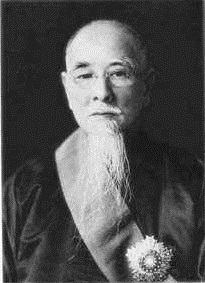Lenses
Lin Sen ( Chinese 林森 , Pinyin Lín Sēn ; * 1868 in Shanggan, Minhou , Fujian ; † August 1, 1943 in Chongqing ) was head of state of the Republic of China from 1931 until his death .
Life
Lin Sen was born into a middle-class family and attended a school run by US missionaries. From 1884 he was employed in the Telegram Bureau of Taipei. After the First Sino-Japanese War , he became involved in asymmetrical warfare against the Japanese occupiers. From 1902 he was employed by the customs authorities in Shanghai . He later lived in Hawaii and in 1905 in San Francisco , where he was an official of the Tongmenghui and overseas representative of the Kuomintang .
He led the Xinhai Revolution from October 10, 1911 to February 1, 1912 in Jiangxi Province . He became speaker of the National Assembly . In 1917, after a failed coup against President Yuan Shikai , Lin fled to Japan with Sun Yat-sen , where he joined the Chinese Revolutionary Party , a predecessor group of the National People's Party of China (Kuomintang). As the party's envoy, Lin Sen traveled to the United States to solicit support. In 1917 he followed Sun to Guangzhou , where he publicly opposed the Beiyang government . In the same year he was appointed governor of Fujian .
Lin was a member of the right wing of the Kuomintang. This so-called West Mountains faction ( Chinese 西山 派 ) was founded shortly after Sun's death in 1925 near the Temple of Jade Green Clouds in Beijing's West Mountains. At the 1925 National Assembly, right-wing officials called for an end to the united front between the National People's Party and the Chinese Communist Party (CCP), believing that the CCP revolution was incompatible with the Kuomintang national revolution. Because of this demand, the leaders of the Westberge faction were expelled from the Kuomintang. From 1926, however, they unanimously supported the party's northern campaign , through which Chiang Kai-shek was able to announce Chinese reunification in 1928 . After the establishment of the national government, Lin often traveled abroad to seek further support for the Kuomintang.
On December 15, 1931, Chiang Kai-shek gave the office of President of the Republic of China to Lin Sen, which was confirmed on January 1, 1932 by parliament. The Time named Lin as the representative president in 1934 and speculated whether the tariff concessions Chiang had to grant the Japanese were the price for the postponement of the occupation of China by Japan. The widower Lin advocated monogamy ; the cohabitation was illegal in China since 1935, and he called for a peaceful solution, as Chiang at the Xi'an Incident was kidnapped. In 1937, during the Second Sino-Japanese War , he relocated the seat of government to Chongqing , propagated asymmetrical warfare and refused to cooperate with the government of Wang Jingwei . On March 10, 1943, his passenger car was involved in an accident. On March 12, 1943, he suffered a stroke while visiting a Canadian delegation. In the hospice, he demanded that Taiwan become Chinese in the post-war order, a request that was posthumously granted in the Cairo Declaration .
Individual evidence
- ^ Dieter Kuhn : The Republic of China from 1912 to 1937. Draft for a political history of events . In: Würzburger Sinologische Schriften . 3. Edition. 2007, p. 332 ( online [PDF]).
- ↑ Time , Aug. 20, 1934, CHINA: Chiang on Lid
| personal data | |
|---|---|
| SURNAME | Lenses |
| BRIEF DESCRIPTION | Chinese politician; President of the Republic of China |
| DATE OF BIRTH | 1868 |
| PLACE OF BIRTH | Shanggan, Minhou , Fujian |
| DATE OF DEATH | August 1, 1943 |
| Place of death | Chongqing |

